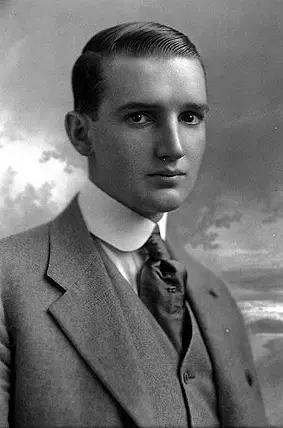The complete monograph by Elizabeth Gibbons:
Side Menu:
26. Identity of the Suicidal Officer
Who then, was the officer seen to dispatch himself with what Rheims regarded as military dignity? The clue seems to lie in Daly's reference to there being no boats left. There was a lapse of unknown but not negligible minutes between lowering No. C and getting No. A down onto the boatdeck and secured in the falls, and the shot occurred during this interval. Of the three deck officers not surviving, Sixth Officer Moody was definitely placed on the roof with a party of seamen struggling to free No. A. (Page 666) There is in any event no reason to believe that he had bothered to obtain his revolver. That leaves only Murdoch and Wilde. And Murdoch was last seen working the falls for No. A.
Henry Wilde is almost certainly the man involved. Of the officers who died that night, Wilde seems to deserve the most sympathy. He had very much not wanted to accept assignment to the Titanic, and from his arrival had been regarded as an interloper, treated by Lightoller at least with considerable disgraciousness. His position had been uncomfortable and not of his choosing from sailing day. No reason for his action can ever be assigned, nor any absolute proof, nothing beyond the most obvious: process of elimination.
The body Daly saw on the deck did not remain long. It was snatched by the sea and simply disappeared. The water had now reached the bridge, and the Titanic was beginning her dramatic slide downward, forward and upward, accompanied by a terrible undefinable sound that Third Class passenger Daniel Buckley would describe to the Senate in one word: it sounded, he said, like thunder. (Page 1022)
Collapsible B was washed off the deck upside down; Collapsible A was now on the boatdeck, attached to the falls, but not yet hanging in the tackle. It was approximately 2:15 am. Lightoller, on top of the officers' quarters, walked to the starboard edge and looked down. Not more than 15 away, Murdoch was working to straighten the falls. (Pages 56-58) It is not stated which end of the collapsible he was near nor whether he was facing the bow; it is unlikely, however, that an experienced sailor would turn his back to the North Atlantic at such a moment. A wave began its ferocious way up the deck as the Titanic lunged forward. Lightoller watched the wave engulf everyone below him. In a moment, collapsible A was afloat in its davits, unattended.
Lightoller lept into the sea forward, was swept under against a grating, somehow ended up on the surface next to No. B. The first funnel gave way under the forward tilt and fell between the ship and the collapsible, pushing it a safe distance. Lightoller and others, mostly crew from the black gang, climbed onto their raft and watched.

Jack Borland Thayer Jr
(Independent Newspaper, UK).
John Thayer, Jr., arrived at No. B somewhere near this time; 28 years after that night, he could remember the ghastly cold of the sea, and the nightmare quality of the Titanic looming above him. She seemed surrounded by an eerie glare of light, he wrote, as though she were on fire. He climbed onto No. B and watched, as survivors of Troy had once watched from the dark as Agamemnon's men burned their city. The sight haunted him all his life.
It was now, with the Titanic still present, that Captain Smith purportedly swam up to No. B and asked "Where is Murdoch?" He clearly expected his First Officer to have escaped. Someone from the crew said: "He's dead". Smith then said he would follow his ship; he swam away. Thayer later also recalled the men on No. B trying to locate "the Chief"; he did not know whether they meant the Chief Engineer, Wilde or Captain Smith. It is possible that they meant Murdoch.
The Titanic had now reached the position immortalized in memory and in art, perpendicular, her clipper-shaped stern a black silhouette framed against the arch of heaven. In mere tens of seconds, she settled down into the sea, disappearing quickly and gracefully with a quiet hissing gulp. Appropriately, the Royal Navy ensign at her stern went last. With her to the bottom, over two miles down, went hundreds trapped inside. Behind, on the surface, were hundreds more who vanished one by one and a thin gray haze that soon dissipated. In the stillness that came with the death of those in the sea, Fourth Officer Boxhall could hear the soft whispering of waves against the icebergs still hidden in the dark. No god with a grudge could have asked for more.
